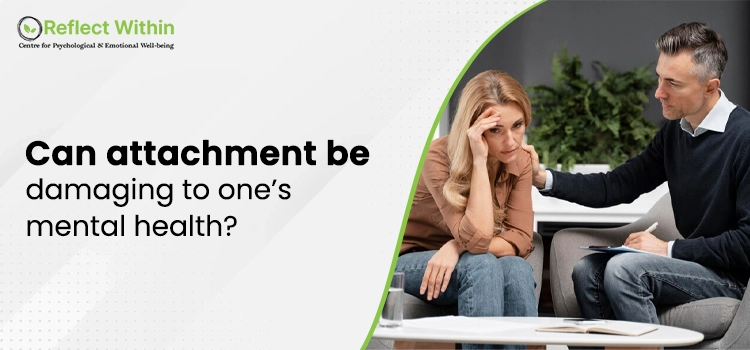
We tend to make attachments with not just people, but our things, animals, places and so much more. It is a crucial part of our existence and also forms the premise to our mental health. However, if the attachments are made with the individuals having difficulty in attachment patterns, it can have detrimental impact on one’s mental health, if there concerns are unaddressed and severe in nature. The insecure attachments in a relationship can not only make things complicated but can also create a sense of self-doubt when the issues don’t get resolved.
There are various factors that can affect the way you make attachments with friends and partners in the future. Here, we will try to understand this tendency with the help of attachment theory and also discuss the negative impacts of insecure attachments on mental health. Let’s roll!
Attachment Theory: An Overview
Before establishing the relationship between the attachment and mental health, it is crucial to understand the attachment theory. The belief foundational to the attachment theory says that people are inherently driven and wired to develop close emotional bonds with other people.
According to this theory, humans are born with an innate need to form emotional bonds with their caregivers. It can also be linked with the evolutionary past, wherein they needed to make attachments with the caregivers in order to make things favourable for their survival. Thus, the evolutionary attachment experiences can influence our capacity to establish relationships in life.
What Are Different Types of Emotional Attachments?
There are different forms of the emotional attachments with their unique characteristics and consequences. Also, one form of attachment can be more beneficial from other.
- Secure Attachment
Secure attachment is one of the most prevalent and healthy forms of attachment. It’s a sign of healthy emotional and social development of an individual who is resilient and able to demarcate between individual’s needs in a relationship. When you are at ease in one’s company and can rely on them for your emotional needs. Thus, with such individuals you can expect a healthy bond that involves mutually working on conflicts and having a considerable approach in maintaining a close relationship with your partner.
- Anxious Attachment
Anxious attachment is neither secure nor helpful. It can emerge from a constant fear of being abandoned by the partner. Individuals with this attachment believe that their partner won’t show up in the times of need. People who show needy or clingy behaviour often experience this type of attachment. Individuals showing this pattern are underconfident and have poor self-esteem, which makes them depend on constantly seeking validation and reassurance from their partners which can in turn become quite exhausting for the other partner.
- Avoidant Attachment
Avoidant attachment is also a form of the insecure attachment. This occurs when you experience an inability to get close to someone. In this type of the attachment, the physical or emotional intimacy is often missing. Any individual with this tendency could have insecurity emerge out of the constant neglect, rejection or loneliness in their past relationships or childhood. They might also fail to deal with conflicts or disagreements, if it’s difficult for them to process negative emotions, they might end up finding an escape instead of wanting to work on it.
- Disorganized Attachment
Disorganized attachment is also one of the insecure attachments, yet not so much prevalent. This is characterized by the conflicting feelings of the avoidance and inclination towards the partner at the same time. Some of the most apparent reasons behind this are Relationship anxiety, fear, and confused or indecisive mental state.
How Does Attachment Affect The Mental Health Adversely?
Forming relationships is an integral and inevitable part of our existence that has also facilitated our survival for ages. We form relationships to gain a sense of security and dependence. We are hard-wired to this feeling. However, not all attachments are secure, and they can affect an individual with mental health issues, such as depression, anxiety, and several others.
As per research, early attachment experiences play a crucial role in how people’s mental health turns out later in life. The secure attachments in childhood can help them foster high self-esteem and the ability to control emotions. On the contrary, children who experience abuse or neglect often develop insecure attachments. This can lead to a multitude of other mental health disorders.
To understand the negative effects on mental health, we need to understand a few important aspects related to it, which are:
- Forms of Attachment
As discussed, there are different forms of attachment in individuals. However, there are two major categories: secure and insecure. People with secure attachments develop a positive attitude towards themselves and another person. However, people with anxious-preoccupied attachment remain fretful about the fear of being abandoned by their partner. Avoidant people suffer from conflicting needs for emotional closeness and rejection anxiety. Therefore, the form of the attachment plays an important role in their mental health.
- Communication
The role of communication is pivotal in maintaining a relationship, regardless of the form of attachment. The major concerns in a relationship can be addressed with the help of effective communication. People in secure relationship make open communication with the partner, which helps them to work out their differences. Contrarily, people with insecure attachment find it difficult to speak their heart out about their needs, desires, and expectations as it can overwhelm them knowingly or unknowingly.
- Impact On Mental Health
The attachment style we develop interferes with different areas of our lives and can have a significant impact on mental health. If you have a secure attachment, you will have a fulfilling in your relationship and can resolve conflicts with ease. On the other hand, insecure attachment can evoke different negative feelings, such as jealousy, anxiety, consistent fear of rejection, inability to voice your feelings, over dependency on a partner, loss of individuality in interpersonal relationships etc. When the pressing matters in a relationship are not addressed, it can have many negative effects on mental health.
- Later Alterations
Forms of attachment highly depend upon the childhood experiences and relationship with the caregiver or parent. The unhealthy attachments are formed due to unhelpful ways of thinking towards the relationship or partner, caused due to the deeper and sometimes unknown
insecurities. However, when these issues are addressed in a safe environment with the help of a professional, goals to work upon for insecure attachments can be identified. However, the unhealthy attachment patterns can evolve over a stipulated period of time with realization or be healed with therapy and introspection.
Negative Effects of Insecure Attachment On Mental Health
We have seen that the attachment style can interfere with your mental health. When it happens, an unhealthy emotional attachment may arise. It makes individuals seek constant approval from others. Besides, the person remains in a toxic relationship, feeling tense, anxious, or depressed. It may also evoke an incessant pursuit of new relationships. These factors can have several negative impacts, such as:
- Anxiety
- Uncertainty in relationships
- Hypersexuality
- Depression
- Social isolation
- Increased social media use
- Lack of trust in others
- Lowered self-esteem
- Loneliness
- Using substances to cope
Summing Up!
Insecure attachment can be injurious to mental health, and our past experiences and some other factors can affect what form of attachments we make with others. Fortunately, this pattern can be altered with time, open communication and introspection. Besides, if it is severely impacting your relationship or impacting your mental health, you can seek an expert’s assistance to get help.










